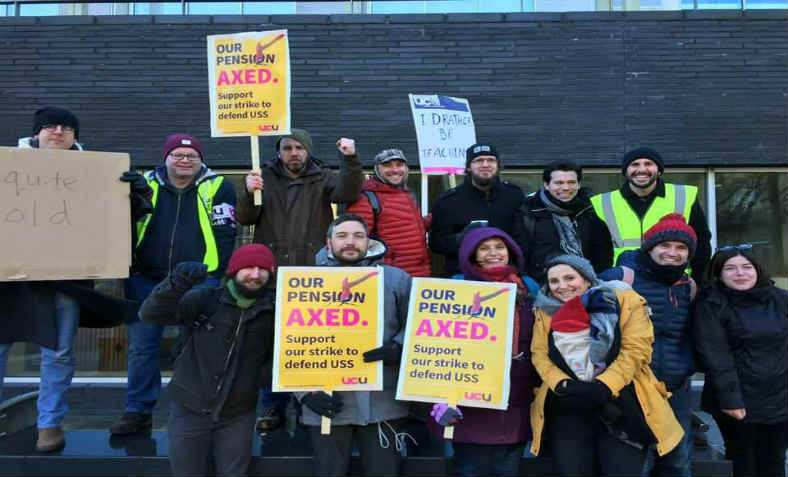 Solidarity at Bristol University. Photo: Naz Massoumi
Solidarity at Bristol University. Photo: Naz Massoumi
The UCU strike is not just about pensions. It is an opportunity to fight for a new vision for Higher Education, argues Milly Williamson
This month, Higher Education staff and students in London and across the country joined demonstrations to resist the ruin of the University Superannuation Scheme (USS). This followed five days of brilliant strike action, with another two weeks of strike action planned. In my 20+ years of working in HE, I have never witnessed such a political atmosphere amongst university lecturers and administrators, nor such determination to defend our conditions.
There is an incredible strength of feeling and a mood of trade union militancy that I’ve never seen in HE. Up and down the country we have seen tens of thousands of UCU members on picket lines in Arctic weather as well as massive, imaginative and inspiring teach-outs, rallies and demonstrations.
Support from students has been wonderful and moving. Government and employers have tried to pit students against staff with talk of the education ‘market’ and ‘value for money’, but they have utterly failed to do so. Students and UCU members share an understanding of this dispute as part of a broader attack on education – as part of the attempt to transform education into business and an enclave for the wealthy. People who work and study in HE are fully aware that it is the same university management, represented in this dispute by Universities UK, who have presided over a real term pay cut for academic staff while trebling student tuition fees and plunging students into unacceptable levels of debt.
At the same time the salaries of vice-chancellors have skyrocketed to an average of over £257,000 per year. The employers are now attacking staff pensions as part of a package of cuts, including cuts to library resources, and even, scandalously, to disability and student services. Introducing the market in education has been as ugly and dysfunctional as it has been in other sectors of public life.
Meanwhile, both staff and students are making these political connections and developing a wholly different vision of what Higher Education could look like. Education is a public good. It benefits the whole of society and should not be a profit-making enterprise; universities should be accountable and democratically run institutions. We should not saddle the next generation with staggering debt. Society should fund the education of our young people and staff should be paid properly and be assured of a secure retirement after a lifetime commitment of teaching our students. The fight for our pensions is part of the bigger struggle for a truly public education system.
For many years, university staff have faced pay cuts and increasingly bullying management but have lacked the confidence to take on the employers. What is different now? Part of the incredible new mood of militancy is connected to the rise of Jeremy Corbyn and the very welcome reintroduction of socialist ideas into public life. Such ideas offer hope and the possibility of a different kind of society run in the interests of the majority rather than for the elites. This new political mood has contributed a great deal to the confidence and determination of university staff to stand up and fight for our conditions. And a new generation is learning that collective action is a powerful tool for change. It is our solid and widespread action that has forced the employers back to the negotiating table after months of refusing to budge and it is action that will win this dispute. Now is the time to stand firm and step up the pressure.

